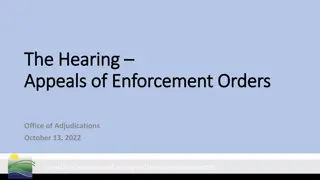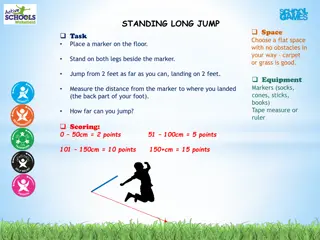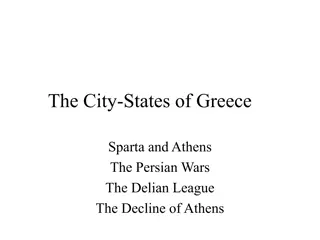Ultimate Marathon Preparation Guide
Marathon participation is on the rise, attracting more novice runners each year. Training, dedication, and proper nutrition are essential for success. Remember your reasons for signing up, focus on health goals, and be mindful of calorie intake to support your training. This guide provides insights into the growing marathon trend, motivations, nutrition tips, and the reality of marathon running today.
Download Presentation

Please find below an Image/Link to download the presentation.
The content on the website is provided AS IS for your information and personal use only. It may not be sold, licensed, or shared on other websites without obtaining consent from the author. Download presentation by click this link. If you encounter any issues during the download, it is possible that the publisher has removed the file from their server.
E N D
Presentation Transcript
SO YOU WANT TO RUN A MARATHON Boone Barrow, MD Scott & White Clinic Sports Medicine
We are different, in essence, from other men. If you want to win something, run 100 meters. If you want to experience something, run a marathon. --Emil Zatopeck, 1952 Olympic Gold Medalist
A little background Marathon participation is growing at a rapid rate. >10% increase in the number of finishers from 2010 to 2013 in sanctioned events. Half-marathon distance participation is growing even faster. Finish time for marathon and half marathon finishers has been slowly increasing over the last several decades. This is due to the increasing popularity of distance running by casual runners. In 1980, 10% of marathon finishers were female. In 2013, that number had risen to 47%. Annually, more women than men now enter the half-marathon distance.
A little background What does this actually mean for you? More people running everybody has to run their first marathon . Higher percentage of runners are novice or first time marathoners Marathon finishing times are actually getting longer. There are more people running marathons for their own personal reasons (fitness, cardiovascular, bucket list ) and fewer elite runners.
Motivation/Desire This sounded like a good idea in March . There are very few who will be able to gut it out and run a marathon on willpower alone. This will take training, dedication and planning Remember why you signed up for this. You wanted to: Lower your cholesterol Improve your heart health Lose some weight. Put that little bumper sticker on your car and impress your friends.
Nutrition We are all trying to live a more healthy lifestyle. This will mean eating smarter. Running, of course, burns calories this doesn t mean you get to add to your current diet and justify this by saying you re training for a marathon and need the extra energy . Men burn an average of 125 calories per mile of running Women burn an average of 105 calories per mile of running. 1 serving of Ben & Jerry s ice cream = 280 cal. Did anyone really stop at half a cup of ice cream? You have to run ~2.5-3.0 miles to burn those cal. It takes me about 30 min to run 3 miles .
Nutrition If you are running to try to loose weight, you may still need to decrease your caloric intake in addition to running. Add more protein and fiber to your diet as your mileage increases.
Fluids The average person sweat between 27-47 oz. per hour of hard running. Alberto Salazar set a marathon record with 127 oz of sweating per hour while preparing for the 1984 Olympics. Most of us will need a combination of water and electrolyte containing fluids while running. Alternating at each water station is one option. Know your sweat rate: Weigh yourself without clothes in the morning before a 1 hour run. Weigh yourself after the run. The difference minus the exact number of ounces of fluids consumed during the run is the sweat rate/hour.
Fluids Believe it or not, you can overhydrate. In the past, the mantra was drink, drink, drink. Water was by far the liquid recommended. As (ahem) slower runners are taking part in the marathon community, there has been a new problem that has started showing up. Dilutional hyponatremia is simply overhydrating with water to the point of diluting your body s electrolytes. Mostly seen in slower runners that are overly aggressive in their water intake. You. Need. Salt. Your favorite sports drink will likely suffice.
Fluids If you are worried about calories during shorter runs (2-6 miles), there are some calorie free sports drinks. While you are training, you can use this as a guide. Running for 0-30 minutes water Running for 30-60 minutes water plus electrolytes Running for >60 minutes water plus electrolytes plus calories
Nutrition There are a variety of gels, bars, solutions and even jelly beans that are made with endurance sports in mind. Until you are running for more than 60 minutes at a time you really don t need any extra nutritional supplementation. Try out several of these supplements and see which one works for you. You are not just looking for something that tastes good in your kitchen, but something you can eat quickly after. Granola bars or breakfast bars often work well also. Eating a snack after a long run can help replenish glycogen stores in the liver.
Sleep IT S A TWO WAY STREET. EXERCISE IMPROVES SLEEP PATTERNS AND GETTING ENOUGH SLEEP IMPROVES EXERCISE QUALITY AND QUANTITY. SLEEP IS WHEN YOUR BODY REPAIRS DAMAGED TISSUE. RUNNING 25-35 MILES/WEEK IS NOT A BENIGN PROCESS. YOU MUST ALLOW YOUR BODY TO REPAIR ITSELF. PLENTY OF STUDIES USING EXERCISE TO HELP WITH INSOMNIA. SEVERAL STUDIES QUANTIFY HOW MUCH SLEEP IMPROVES PHYSICAL PERFORMANCE. ANECDOTALLY, I JUST DON T FEEL AS WELL IF I AM AN HOUR SHORT OF MY REGULAR AMOUNT OF SLEEP.
Training Regimen There are a number of different programs available. Most would work for the average runner. There are a few things to keep in mind. Don t over train. Your body can accommodate almost any stressor if given enough time to adjust. Try not to increase your weekly mileage by more than 10% per week. This may not seem like a big enough difference early on, but sudden jumps in mileage leads to overuse injuries. Once you get to the 3-5 mile mark, you ll want to add a long run . This is usually at the end of the week after a day of or two of not running. Your short runs may not change dramatically over the next few months, but the distance runs build towards 26.2 miles. Cross training is important. Try to avoid running as your only exercise. Muscle confusion Flexibility Avoiding overuse injuries.
Half Marathon Training: Novice Week Mon Tue Wed Thu Fri Sat Sun 1 Stretch & Strengthen 3 M 2 M or CT 3 M + CT Rest 30 min CT 4 M 2 Stretch & Strengthen 3 M 2 M or CT 3 M + CT Rest 30 min CT 4 M 3 Stretch & Strengthen 3.5 M 2 M or CT 3.5 M + CT Rest 30 min CT 5 M 4 Stretch & Strengthen 3.5 2 M or CT 3.5 M + CT Rest 30 min CT 5 M 5 Stretch & Strengthen 4 M 2 M or CT 4 M + CT Rest 30 min CT 5 M 6 Stretch & Strengthen 4 M 2 M or CT 4 M + CT Rest or easy run Rest 5K Race CT=Cross Train
Half Marathon Training: Novice Week Mon Tue Wed Thu Fri Sat Sun 7 Stretch & Strengthen 4.5 M 3 M or CT 4.5 M + CT Rest 50 min CT 7 M 8 Stretch & Strengthen 4.5 M 3 M or CT 4.5 M + CT Rest 50 min CT 8 9 Stretch & Strengthen 5 M 3 M or CT 4.5 M + CT Rest Rest 10 K Race 10 Stretch & Strengthen 5 M 3 M or CT 4.5 M + CT Rest 60 min CT 9 M 11 Stretch & Strengthen 5 M 3 M or CT 4.5 M + CT Rest 60 min CT 10 M 12 Stretch & Strengthen 4 M 3 M or CT 2 M Rest Rest
Full Marathon Training: Novice/Moderate Week Mon Tues Wed Thurs Fri Sat Sun 1 Rest 3 mile run 3 mile run 3 mile run Rest 6 mile run Cross train 2 Rest 3 mile run 3 mile run 3 mile run Rest 7 mile run Cross train 3 Rest 3 mile run 4 mile run 3 mile run Rest 5 mile run Cross train 4 Rest 3 mile run 4 mile run 3 mile run Rest 9 mile run Cross train 5 Rest 3 mile run 5 mile run 3 mile run Rest 10 mile run Cross train 6 Rest 3 mile run 5 mile run 3 mile run Rest 7 mile run Cross train 7 Rest 3 mile run 6 mile run 3 mile run Rest 12 mile run Cross train 8 Rest 3 mile run 6 mile run 3 mile run Rest Rest Marathon
Full Marathon Training: Novice/Moderate Week Mon Tues Wed Thurs Fri Sat Sun 9 Rest 3 mile run 7 mile run 4 mile run Rest 10 mile run Cross Training 10 Rest 3 mile run 7 mile run 4 mile run Rest 15 mile run Cross Training 11 Rest 4 mile run 8 mile run 4 mile run Rest 16 mile run Cross Training 12 Rest 4 mile run 8 mile run 5 mile run Rest 12 mile run Cross Training 13 Rest 4 mile run 9 mile run 5 mile run Rest 18 mile run Cross Training 14 Rest 5 mile run 9 mile run 5 mile run Rest 14 mile run Cross Training 15 Rest 5 mile run 10 mile run 5 mile run Rest 20 mile run Cross Training 16 Rest 5 mile run 8 mile run 4 mile run Rest 12 mile run Cross Training 17 Rest 4 mile run 6 mile run 3 mile run Rest 8 mile run Cross Training 18 Rest 3 mile run 4 mile run 2 mile run Rest Rest Marathon
Day Before the B/CS Marathon Rest. Take advantage of this day. Make your kids mow the grass. Talk your significant other into a foot rub. There s a lot of discussion as to what to eat the night before the marathon. Carb loading is something you ll hear a lot about. If you ve been resting the last 2 days and have been eating a fairly normal diet, your liver is at capacity with glycogen. With 12 hours to go prior to the marathon, you want simple, easy to digest foods. Avoid rich, fatty foods. You may have 1 alcoholic drink with supper. Avoid food you ve never eaten before. Get to bed early. Don t underestimate how inadequate sleep can affect your performance.
B/CS Marathon Day!!!!! Don t do anything you wouldn t normally do on the morning of the race. Get to the race site 30-45 minutes (at least) prior to the race beginning. Caffeine and alcohol aren t nearly as dehydrating as we used to think. If you normally have a beer with supper, it s ok to do this the night before the race. If you usually have 2 cups of coffee to start the day that s fine. Just finish eating/drinking at least 1 hour before race time. Don t try that new gel or electrolyte solution on the day of the race. Never know how you ll react and you don t want to introduce any additional stressors to your system on your big day.

























